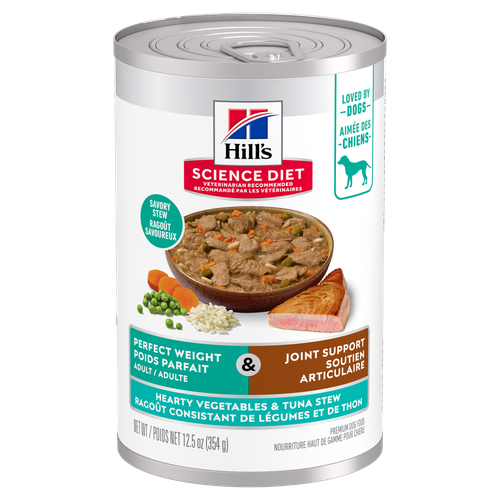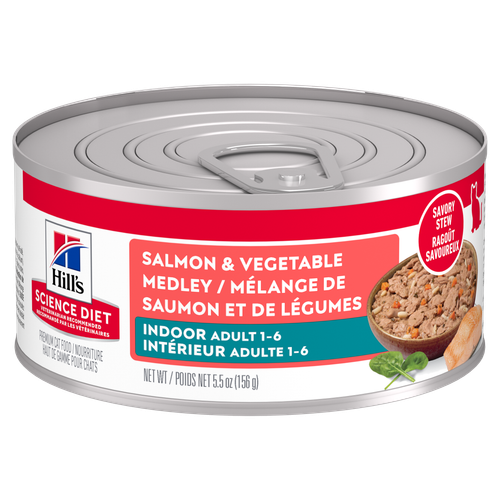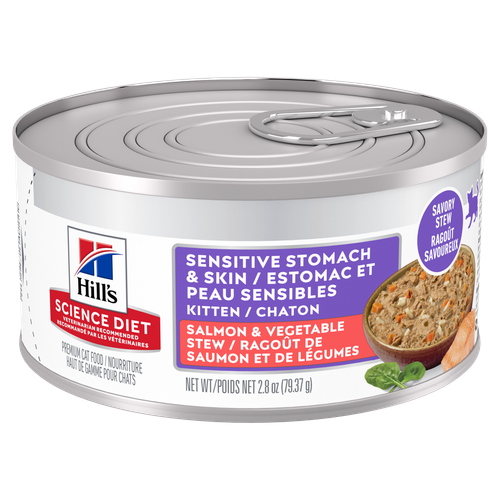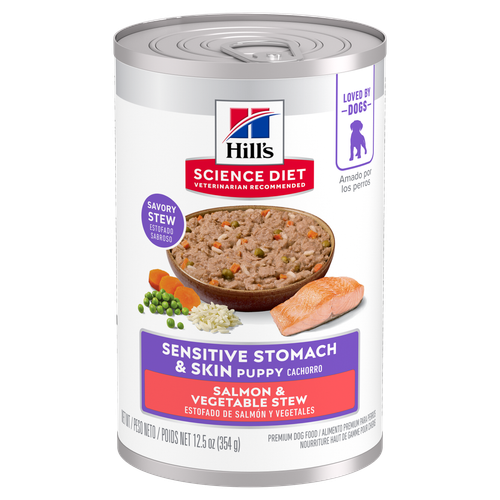
-
Find the right food for your petTake this quiz to see which food may be the best for your furry friend.Find the right food for your petTake this quiz to see which food may be the best for your furry friend.Featured products
 Healthy Cuisine, Adulte, assortiment de conserves
Healthy Cuisine, Adulte, assortiment de conservesHill's Science Diet Healthy Cuisine Variety Pack
Shop Now Sensitive Stomach & Skin, assortiment de conserves
Sensitive Stomach & Skin, assortiment de conservesHill's Science Diet Sensitive Stomach & Skin Variety Pack
Shop Now Adult Perfect Weight & Joint Support Hearty Vegetables and Tuna Stew Dog FoodShop NowFeatured products
Adult Perfect Weight & Joint Support Hearty Vegetables and Tuna Stew Dog FoodShop NowFeatured products Adult Indoor Salmon & Vegetable Medley Cat Food
Adult Indoor Salmon & Vegetable Medley Cat FoodPrecisely balanced nutrition for indoor cats with the delicious taste of savory salmon and vegetables
Shop Now Kitten Sensitive Stomach & Skin Salmon & Vegetable Stew
Kitten Sensitive Stomach & Skin Salmon & Vegetable StewSupports kitten growth, digestive health, nourishes skin and promotes a lustrous fur
Shop Now Adult Urinary Hairball Control Savory Chicken Entrée cat food
Adult Urinary Hairball Control Savory Chicken Entrée cat foodSupports the health of the whole urinary system with optimal levels of magnesium
Shop Now -
Dog
- Dog Tips & Articles
-
Health Category
- Weight
- Food & Environmental Sensitivities
- Urinary
- Digestive
- Joint
- Kidney
- Dental
- Cancer
-
Life Stage
- Puppy Nutrition
- Adult Nutrition
- Senior Nutrition
Cat- Cat Tips & Articles
-
Health Category
- Weight
- Skin & Food Sensitivities
- Urinary
- Digestive
- Kidney
- Dental
- Stress
- Cancer
-
Life Stage
- Kitten Nutrition
- Adult Nutrition
Featured articles Compare Your Pet Food's Calories to Other Brands
Compare Your Pet Food's Calories to Other BrandsCompare Hill's Science Diet dog and cat food's calories against other pet food brands and AAFCO recommended maximum calorie count.
Read More The Incredible Science Behind Your Pet's Microbiome
The Incredible Science Behind Your Pet's MicrobiomeLearn what a pet's microbiome is, how it contributes to your pet's gut & overall health, and why nutrition is important in maintaining healthy microbiomes.
Read More Pet Food Storage Tips
Pet Food Storage TipsDiscover how and where to store your dry, as well as canned, dog and cat food. Learn how to find the "best before" dates on all Hill's pet food packaging.
Read More -


Your relationship with your dog is incredibly special. Your pet brings you joy, comfort and companionship and somehow always knows when you're feeling sad or sick. As a loving dog parent, you want to bring that same intuition, safety and comfort to your beloved pet. That's why it's so heart-wrenching when your dog looks up at you, wide-eyed, with their head between their paws.
Why do dogs look sad?
Many people find themselves debating whether it's a perception, evolution, or whether a dog is actually sad. Desperate to bring joy into your dog's life, you may grow concerned that there are health issues at stake, or that this is an emotional response to a change in your home.
More importantly, you might be wondering if their sad look could it be a health issue or is it just an emotional response? Read on to dig into some answers.
Why Do Dogs Look Sad?
Researchers have sought to understand what causes dogs to make the sad puppy eyes they're known for. A study published by Scientific Reports found that dogs alter their facial expressions in response to human attention. Researchers observed 24 family dogs of various ages and breeds and their reactions to four different scenarios: human attention with food, human attention without food, no human attention with food and no human attention without food. While food didn't impact the dogs' expressions, the researchers found that the dogs were more expressive when a human faced them. In these situations, dogs were more likely to raise the inner eyebrow, making them look sad and more childlike.
Additional research published by Proceedings of the National Academy of Sciences dug deeper into what causes dogs' different facial expressions. The authors of the study hypothesized that over their 33,000-year evolution from wolves to the lovable pets they are today, dogs developed strong eyebrow muscles that allow them to make sad puppy eyes. This, the study's authors claim, was in response to humans' preference for the trait.
So if you're wondering why your dog looks sad it may bring you some comfort to learn that the sad, longing look in your dog's eyes may not be sadness at all. It may simply be that they're trying to connect with you or get your attention.



Tasty Tips
How Can I Tell If My Dog Is Depressed?
All this said, dog depression is a real thing. Signs of depression in dogs are similar to signs of depression in humans. Depressed dogs may exhibit:
- A decreased appetite
- Excessive licking, especially of the paws
- Disinterest or loss of interest in walks, playtime and/or other formerly loved pastimes
- Poor sleep or disturbance in sleep patterns
- Excessive clinginess to you or another family member
- Sudden destructive behaviors
- Accidents inside the home
Signs like these may indicate that your dog is in pain, experiencing a health issue or experiencing deep sadness. If you notice any of these signs for a prolonged period of time, contact your veterinarian. They can help you determine whether your dog is experiencing physical pain or illness and help find solutions to get you dog back to their happy selves.
Believe it or not, dogs do feel emotional pain, including grief, says the American Kennel Club. They can even pick up on people's sadness, which means their sadness may be a reflection of your emotions or those of another family member. Pay close attention to this. If your pet is picking up on your sadness, it's possible that some self-care could be in order. To ensure you're taking the best possible care of your pet, you must also take care of yourself.
Dogs can also feel depressed for other reasons, such as the loss of another household pet or a family member or a major change in their home or living situation. If you've recently taken on a new responsibility and have less time to play with them, it's possible they could be feeling ignored. They may even be coping with feelings of jealousy if, for example, a new human or pet has entered the family. Or they may simply be bored.
Why Does My Dog Look So Sad?
Your dog's big puppy eyes might sometimes prompt you to ask why they look so sad, but researchers seem to believe that the classic sad dog look has more to do with evolution, communication and connection than with a dog's emotional health.
Depression in dogs, on the other hand, tends to be more subtle. Stay attuned to any prolonged changes in behavior and consider potential reasons your dog may not be feeling as happy as usual.
One of the most important factors in your dog's emotional health is the bond between the two of you. Find things you and your pet love to do and make time for them each day. By allowing ample time for play, exercise and petting sessions, you can ensure you're doing everything possible to keep your dog happy. For more insight into dog depression, consult your veterinarian or a dog behavioral expert — learn more about what a veterinary behaviorist is.


Erin Ollila believes in the power of words and how a message can inform—and even transform—its intended audience. Her writing can be found all over the internet and in print, and includes interviews, ghostwriting, blog posts, and creative nonfiction. Erin is a geek for SEO and all things social media. She graduated from Fairfield University with an M.F.A. in Creative Writing. Reach out to her on Twitter @ReinventingErin or learn more about her at http://erinollila.com.
Related products

Gentle on stomachs while nourishing skin & supporting development in growing puppies

Hill's Science Diet Healthy Cuisine Variety Pack

Hill's Science Diet Sensitive Stomach & Skin Variety Pack

Related articles

Discover fun and engaging games and other ways to help your dog exercise, keeping him happy and healthy.

Gather the following puppy supplies to prepare your family for all the fun (and commitment) that comes with being a dog parent.

Learn how to stop your dog from begging at the dinner table, and understand how it can help contribute to his health.

Proper nutrition for your pregnant or nursing dog is vital to her and her puppy's health. Learn what you should do provide her with the proper nutrients.

Put your dog on a diet without them knowing
Our low calorie formula helps you control your dog's weight. It's packed with high-quality protein for building lean muscles, and made with purposeful ingredients for a flavorful, nutritious meal. Clinically proven antioxidants, Vitamin C+E, help promote a healthy immune system.
Put your dog on a diet without them knowing
Our low calorie formula helps you control your dog's weight. It's packed with high-quality protein for building lean muscles, and made with purposeful ingredients for a flavorful, nutritious meal. Clinically proven antioxidants, Vitamin C+E, help promote a healthy immune system.

